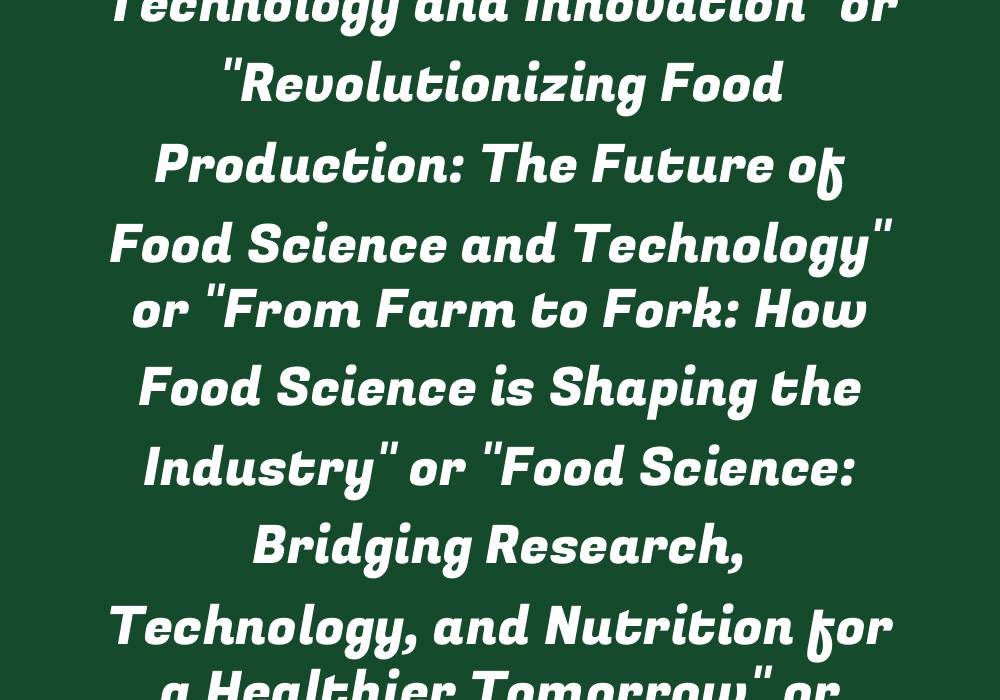Unlocking the Secrets of Food Science: Advancements in Technology and Innovation
Revolutionizing Food Production: The Future of Food Science and Technology
The field of food science has been evolving at an unprecedented rate, shaping our relationship with food, agriculture, and ultimately, our health. With each passing day, we find new ways to enhance the safety, quality, and efficiency of food production, distribution, and consumption. From farm-to-fork innovation to exploring the science behind deliciousness, there’s no denying that food science is revolutionizing our world. This article aims to delve deeper into these advancements and their impact on shaping the future of the industry.
Food Science: Bridging Research, Technology, and Nutrition for a Healthier Tomorrow
The integration of various disciplines in food science research is crucial to developing new techniques and products that promote healthy eating habits and minimize environmental impact. By bridging the gap between scientific knowledge, technological expertise, and nutritional insights, researchers are able to create innovative solutions addressing food-related challenges such as food safety, sustainability, and health promotion.
One area of focus is the development of new technologies and methods for preserving food without compromising its quality or nutritional value. From advanced packaging materials and high-pressure processing to natural preservatives and antioxidants, these innovations are transforming the way we approach the storage and transportation of perishable items.
From Farm to Fork: How Food Science is Shaping the Industry
The impact of food science on modern agriculture and production techniques cannot be overstated. By utilizing innovative methods and technologies, farmers can improve crop yields, reduce environmental impacts, and enhance the safety and quality of agricultural products. Examples include genetically modified crops that are resistant to pests or droughts, precision farming using GPS-guided machinery for efficient land utilization, and controlled environment agriculture (CEA) systems to grow produce year-round without relying on seasonal fluctuations.
Another crucial aspect is the development of functional food products designed to address specific dietary needs or health conditions. By incorporating specialized ingredients that provide additional nutritional benefits, these foods can contribute to improved overall wellbeing and reduce the risk of chronic diseases. Additionally, research is ongoing to understand how food components interact with the human body, allowing for more personalized nutrition advice tailored to individual requirements and preferences.
The Science Behind Deliciousness: Understanding Food Texture, Flavor, and Quality through Technology
In recent years, food science has turned its attention towards analyzing the sensory aspects of taste, texture, and aroma in order to create more appealing products. By utilizing advanced analytical techniques such as gas chromatography and mass spectrometry, researchers can identify the specific components that contribute to a particular flavor profile or texture characteristic. This knowledge is then used to modify recipes and formulations for better overall palatability and consumer satisfaction.
Additionally, technological advancements in food production have resulted in higher quality products that maintain their freshness and taste longer than conventional methods could. This includes the development of rapid freezing techniques, advanced packaging materials with extended shelf-life, and minimally invasive processing methods that preserve the integrity of delicate ingredients while enhancing their flavor and texture properties.
Conclusion
As we move into a new era of food science innovation and technological advancements, the importance of these breakthroughs cannot be overstated. From farm to fork, every step of the food production process is being reimagined and transformed for the better, with significant implications for both consumer health and environmental sustainability. By continuing to invest in research and development within this rapidly growing field, we can look forward to a future where nutritious, delicious, and environmentally friendly food options are readily available for all.
